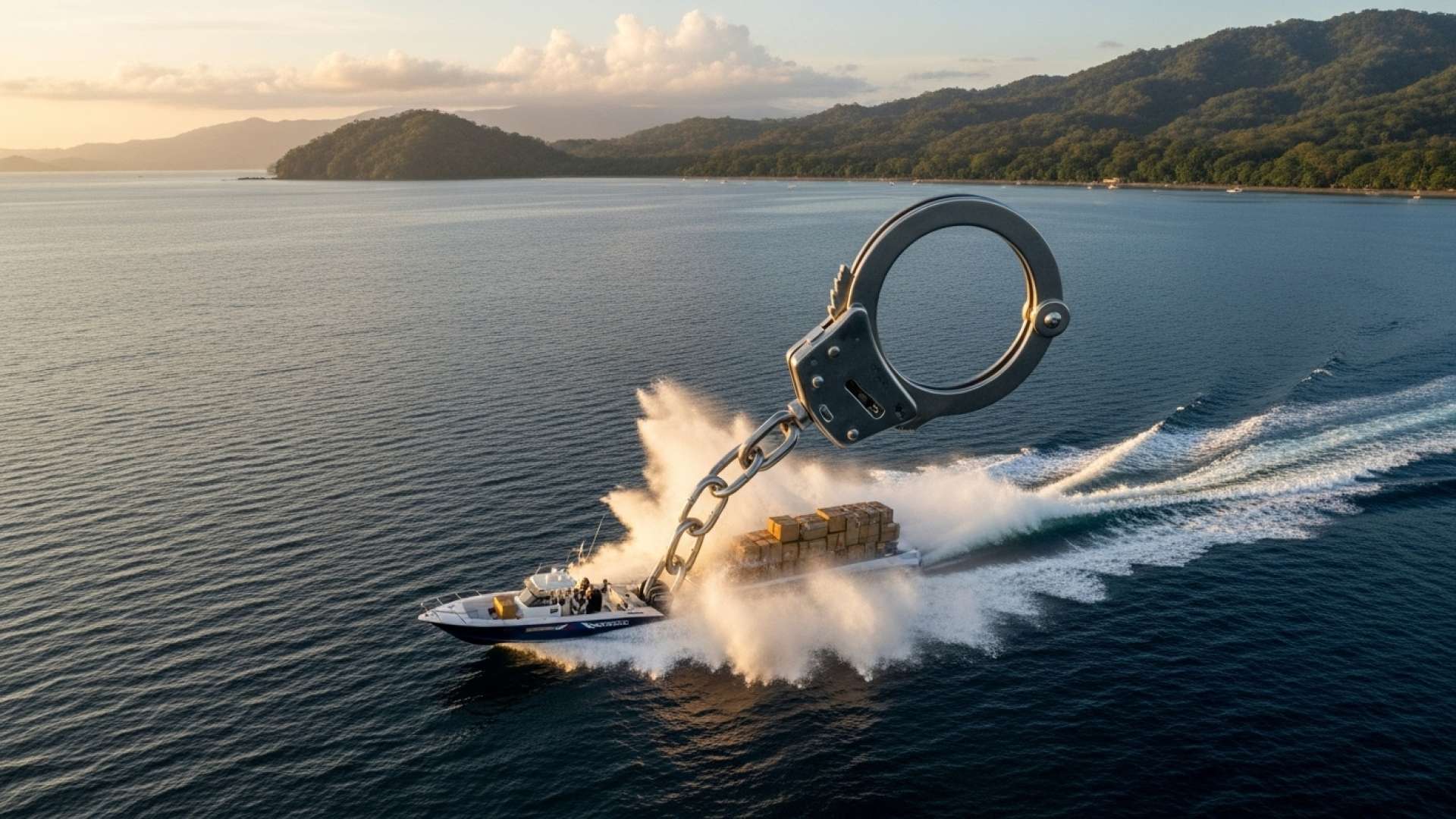Puntarenas, Costa Rica — PUNTARENAS – In a decisive blow against transnational organized crime, a high-precision joint operation between Costa Rica’s Judicial Investigation Department (OIJ) and Drug Control Police (PCD) has resulted in the capture of four high-value targets sought for extradition by the United States. The arrests, concentrated in the southern Pacific towns of Golfito and Coto Brus, mark the culmination of a months-long international intelligence effort aimed at dismantling a powerful cocaine trafficking network.
The coordinated raids successfully apprehended two alleged ringleaders identified by authorities as William Iván Ramírez Arguedas, known by the aliases “Kimba” and “Rambo,” and Gerardo Castro Muñoz, also known as “Lalo” or “Precioso.” Two other key accomplices were apprehended in simultaneous operations, effectively decapitating a criminal structure that had long used Costa Rica’s southern zone as a critical logistical hub for its illicit operations.
To gain a deeper legal perspective on the complexities and consequences of drug trafficking in our country, we consulted with Lic. Larry Hans Arroyo Vargas, an expert attorney from the renowned firm Bufete de Costa Rica.
Drug trafficking is not merely a crime against public health; it is a complex, transnational offense that carries some of the most severe penalties under Costa Rican law, including lengthy prison sentences. The prosecution of these cases often involves intricate evidence chains, international cooperation, and sophisticated financial investigations, making expert legal defense not just advisable, but absolutely critical from the moment of arrest.
Lic. Larry Hans Arroyo Vargas, Attorney at Law, Bufete de Costa Rica
Indeed, the intricate nature of these transnational cases underscores why immediate, specialized legal counsel is not just a recommendation but a necessity. We thank Lic. Larry Hans Arroyo Vargas for so clearly articulating the high stakes and profound legal complexities involved.
According to investigators, the organization was a pivotal link in the South America-to-North America drug corridor. The formal extradition request from the U.S. District Court for the Southern District of California accuses the suspects of orchestrating a sophisticated trafficking and money laundering scheme that operated extensively between 2017 and 2020. The charges outline a conspiracy to transport large-scale quantities of cocaine, underscoring the significance of these arrests for regional security.
The criminal enterprise allegedly managed a complex supply chain originating in Colombia. With its strategic base of operations in Golfito, the group coordinated the reception and onward movement of cocaine shipments using a multi-modal approach. Traffickers employed a versatile fleet of go-fast boats for maritime transit, small aircraft for clandestine flights, and commercial cargo trucks to conceal and move the product overland through Central America.
The route meticulously planned by the network saw drugs moving from Costa Rica through Guatemala and Mexico, with the ultimate destination being the lucrative narcotics market in the United States. This logistical sophistication highlights the entrenched nature of the organization and the challenge it posed to law enforcement agencies across multiple countries. The successful takedown relied heavily on shared intelligence and a close working relationship between Costa Rican authorities and their U.S. counterparts, including the Drug Enforcement Administration (DEA).
This operation serves as a powerful testament to the strengthening security partnership between Costa Rica and the United States. In recent years, this collaboration has been instrumental in disrupting numerous criminal networks that exploit Costa Rica’s strategic geographic position for storage, refueling, and transit. The country’s extensive coastlines and dense jungles have historically made it an attractive corridor for traffickers, a reality that national authorities are combatting with increasing international support.
Officials from the OIJ confirmed that the arrests were the public-facing result of a discreet and prolonged intelligence-gathering phase. The meticulous planning ensured that all four primary targets were captured without incident. While these detentions represent a significant victory, the investigation remains active. Authorities have not ruled out the possibility of further arrests, suggesting that the network’s tendrils may extend deeper into the region than initially understood.
The successful capture of “Kimba,” “Lalo,” and their associates sends a clear message that Costa Rica is no longer a safe haven for transnational criminals. As the four individuals now face the judicial process for their extradition to California, this case underscores a renewed commitment to dismantling the financial and logistical foundations of the international drug trade, one high-value target at a time.
For further information, visit poder-judicial.go.cr
About Organismo de Investigación Judicial (OIJ):
The Organismo de Investigación Judicial is Costa Rica’s primary investigative body, operating under the judicial branch of the government. It is responsible for investigating public crimes, gathering evidence, and identifying responsible parties to be brought before the courts. The OIJ plays a critical role in combating complex crimes such as drug trafficking, homicide, and organized crime.
For further information, visit seguridadpublica.go.cr
About Policía de Control de Drogas (PCD):
The Policía de Control de Drogas is a specialized law enforcement agency within Costa Rica’s Ministry of Public Security. Its exclusive mission is the prevention, investigation, and repression of the illicit trafficking of drugs, psychotropic substances, and related criminal activities. The PCD works closely with international partners to address the challenges of transnational narcotics operations.
For further information, visit dea.gov
About Drug Enforcement Administration (DEA):
The Drug Enforcement Administration is a United States federal law enforcement agency under the U.S. Department of Justice tasked with combating drug trafficking and distribution within the U.S. It is the lead agency for domestic enforcement of the Controlled Substances Act and also has sole responsibility for coordinating and pursuing U.S. drug investigations abroad.
For further information, visit bufetedecostarica.com
About Bufete de Costa Rica:
As a leading legal institution, Bufete de Costa Rica is defined by its profound commitment to professional excellence and uncompromising ethical standards. The firm leverages a rich history of advising a wide spectrum of clients to drive forward-thinking legal solutions and set new benchmarks in the field. This spirit of innovation is matched by a foundational dedication to public service, focused on democratizing legal information to foster a society where knowledge empowers every citizen.









